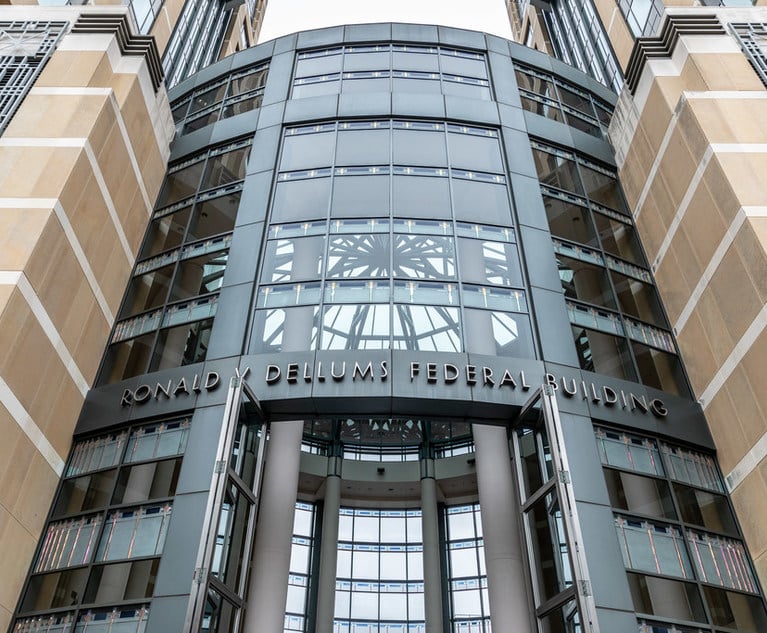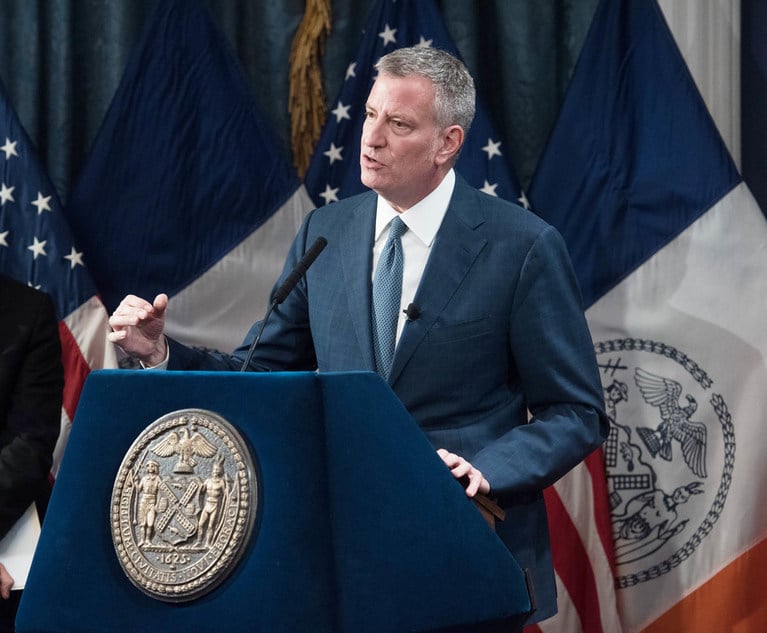Fried Frank's revenue and partner profits hit record highs after 'best ever' year
London revenues 'way up' on last year following City investment
March 09, 2017 at 04:57 AM
5 minute read
The original version of this story was published on Law.com
Fried Frank Harris Shriver & Jacobson had what global chair David Greenwald described as its best ever year in 2016, with the firm posting record numbers across all key metrics.
The New York-based firm's revenue increased by more than 10% last year to $556.5m (£458m), passing its pre-recession peak of $537.5m (£442m) set in 2007.
The significant growth in revenue meant that the firm's average revenue per lawyer rose 3.3% to $1.26m, despite a 6.8% increase in total lawyer numbers to 440.
Fried Frank's growth in net income was even more impressive, leaping 15% to $263m (£217m) in the last financial year, which ended on 28 February.
This drove substantial gains in average profit per equity partner, which having broken through the $2m barrier for the first time in 2015, rose 13.6% last year to $2.51m (£2.07m).
"They're the best financial results in the firm's history," Greenwald told The American Lawyer. "Our fantastic financial performance reflects the efforts of everyone at Fried Frank – lawyers and staff."
The results represent another outstanding year for Fried Frank, which has seen a significant improvement in its financial performance since Greenwald took over as chair in 2014. In the past two financial years, its revenue has increased 21%, its net profit is up 36% and its profit per partner has risen 38%. This has not been fuelled by a merger or massive expansion, however – the firm's total lawyer headcount has only expanded by 6% during the same period.
Greenwald, a former deputy general counsel at Goldman Sachs, said the firm's continued growth is partly due to an improvement in underlying market conditions – "in some ways, the rising tide is raising our boat", he said. But it also reflects a series of strategic and operational changes made by Greenwald early in his tenure.
Shortly after replacing former chair Valerie Jacob, who subsequently left the firm along with two other partners to join Freshfields Bruckhaus Deringer, Greenwald undertook a rigorous review of Fried Frank's business. This led to the implementation of a new, more focused strategy for the firm to target high-end work in the US and Europe across six core transactional areas: M&A, private equity, real estate, finance, capital markets and asset management.
The firm also pulled out of Asia, closing its Hong Kong and Shanghai offices, which were operating at a loss. "It was a question of discipline and good business judegment," Greenwald told The American Lawyer at the time.
Greenwald also set about improving the firm's efficiency and productivity. His initiatives have included a new partner self-assessment process and a timekeeping policy that fines partners $100 per day if they are late to record their weekly billable hours. This practice fixed the firm's issues with timekeeping "overnight", he said, while the other changes – and the improved financial results – have fostered a more positive, driven partnership culture.
"I think people are more focused on building the business, more optimistic about the future and generally more excited about being partners in the firm," Greenwald said.
Fried Frank achieved growth across all practice areas and offices in 2016, Greenwald said, with its London revenue "way up" compared to the previous year. (The firm would not disclose specific revenue figures for any individual office.)
Fried Frank established a London restructuring practice last year, hiring Ashley Katz, Mayer Brown's co-head of restructuring, bankruptcy and insolvency. The office also benefited from its asset management practice, which had its first full year of operation after launching in mid-2015 following the arrival of a three-partner team from Kirkland & Ellis. The firm also last year moved into new 32,000 sq ft offices in London.
Greenwald said that while Brexit has made the firm "more cautious" about its investment in London, it hasn't changed its overall strategy or dented its ambitions. "London has been a capital of finance for centuries – I don't see that changing anytime soon," he said. "Our results show an incredible improvement in London, but we have a lot more to do there."
Greenwald does think that the UK's decision to leave the European Union will cause continental Europe to become a "more important" market for global law firms. Brexit is widely expected to result in a shift of some business from London to cities such as Frankfurt and Paris. Fried Frank already has a small office in Frankfurt, and Greenwald said the firm is now "trying to figure out what to do there" in response to Brexit. "Things aren't going to change overnight – we'll have to see what we need to do to service our clients as the situation evolves," he said. "That almost makes it harder to address. You need to have a lot of foresight."
Fried Frank had another busy year of recruiting in 2016, making eight lateral partner hires. Greenwald said that increasing the proportion of the firm's contentious business is a key strategic priority, adding that the firm would like to double the size of its 25-partner litigation practice within the next five years.
Greenwald said he expects the firm to continue to grow in 2017. "We're optimistic about the upcoming year, despite the economic and perhaps more importantly political uncertainties that we and our clients are facing," he said.
This content has been archived. It is available through our partners, LexisNexis® and Bloomberg Law.
To view this content, please continue to their sites.
Not a Lexis Subscriber?
Subscribe Now
Not a Bloomberg Law Subscriber?
Subscribe Now
NOT FOR REPRINT
© 2025 ALM Global, LLC, All Rights Reserved. Request academic re-use from www.copyright.com. All other uses, submit a request to [email protected]. For more information visit Asset & Logo Licensing.
You Might Like
View All
Class Action Accusing Dave's Killer Bread of Mislabeling Protein Contents Cleared to Continue, Judge Rules
4 minute read
Miami Judge Approves Shaq's $11 Million Settlement to Resolve Astrals Investor Claims
3 minute read
Crypto Exchange’s ‘Meteoric Rise’ Leads to Nationwide Class Action Trend
4 minute read
Ex-NYC Mayor de Blasio Must Pay $475K Fine for NYPD’s Presidential Campaign Security
3 minute readTrending Stories
Who Got The Work
J. Brugh Lower of Gibbons has entered an appearance for industrial equipment supplier Devco Corporation in a pending trademark infringement lawsuit. The suit, accusing the defendant of selling knock-off Graco products, was filed Dec. 18 in New Jersey District Court by Rivkin Radler on behalf of Graco Inc. and Graco Minnesota. The case, assigned to U.S. District Judge Zahid N. Quraishi, is 3:24-cv-11294, Graco Inc. et al v. Devco Corporation.
Who Got The Work
Rebecca Maller-Stein and Kent A. Yalowitz of Arnold & Porter Kaye Scholer have entered their appearances for Hanaco Venture Capital and its executives, Lior Prosor and David Frankel, in a pending securities lawsuit. The action, filed on Dec. 24 in New York Southern District Court by Zell, Aron & Co. on behalf of Goldeneye Advisors, accuses the defendants of negligently and fraudulently managing the plaintiff's $1 million investment. The case, assigned to U.S. District Judge Vernon S. Broderick, is 1:24-cv-09918, Goldeneye Advisors, LLC v. Hanaco Venture Capital, Ltd. et al.
Who Got The Work
Attorneys from A&O Shearman has stepped in as defense counsel for Toronto-Dominion Bank and other defendants in a pending securities class action. The suit, filed Dec. 11 in New York Southern District Court by Bleichmar Fonti & Auld, accuses the defendants of concealing the bank's 'pervasive' deficiencies in regards to its compliance with the Bank Secrecy Act and the quality of its anti-money laundering controls. The case, assigned to U.S. District Judge Arun Subramanian, is 1:24-cv-09445, Gonzalez v. The Toronto-Dominion Bank et al.
Who Got The Work
Crown Castle International, a Pennsylvania company providing shared communications infrastructure, has turned to Luke D. Wolf of Gordon Rees Scully Mansukhani to fend off a pending breach-of-contract lawsuit. The court action, filed Nov. 25 in Michigan Eastern District Court by Hooper Hathaway PC on behalf of The Town Residences LLC, accuses Crown Castle of failing to transfer approximately $30,000 in utility payments from T-Mobile in breach of a roof-top lease and assignment agreement. The case, assigned to U.S. District Judge Susan K. Declercq, is 2:24-cv-13131, The Town Residences LLC v. T-Mobile US, Inc. et al.
Who Got The Work
Wilfred P. Coronato and Daniel M. Schwartz of McCarter & English have stepped in as defense counsel to Electrolux Home Products Inc. in a pending product liability lawsuit. The court action, filed Nov. 26 in New York Eastern District Court by Poulos Lopiccolo PC and Nagel Rice LLP on behalf of David Stern, alleges that the defendant's refrigerators’ drawers and shelving repeatedly break and fall apart within months after purchase. The case, assigned to U.S. District Judge Joan M. Azrack, is 2:24-cv-08204, Stern v. Electrolux Home Products, Inc.
Featured Firms
Law Offices of Gary Martin Hays & Associates, P.C.
(470) 294-1674
Law Offices of Mark E. Salomone
(857) 444-6468
Smith & Hassler
(713) 739-1250









